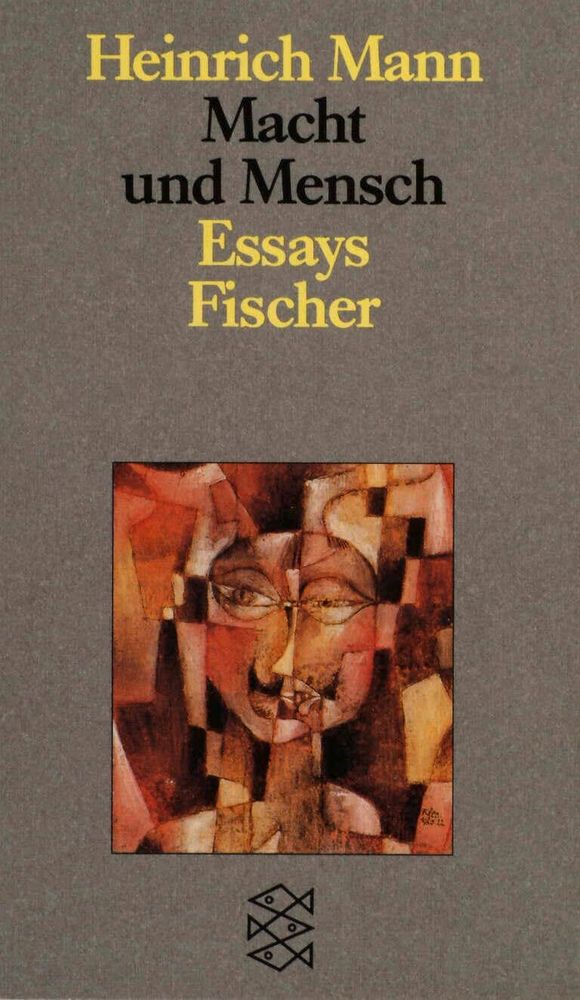Heinrich Mann has understood as a political author throughout his life, apart from his very early beginnings. He has always commented on daily questions in articles, pamphlets and essays. In the essays, which are deeply interwoven into his remaining work, he usually goes beyond the occasion of the day and formulates basic positions for himself and his audience. For the Heinrich Mann trained on the French moralists, there is no question that an artistic person has to be a reminder at the same time and warner that he is partly responsible before the spirit for the social, social and political shaping of his time. The works gathered in this volume Power and Human‹ provide information about the influences and the intellectual processing by Heinrich Mann. Above all are French writers. Because, according to Heinrich Mann: [...] they have educated democracy. This is the effect of Zola, and that is, despite his tendencies, that of Balzac. (For the novel, this revelation of the wide world, this great play of all human contexts, is equal to nature; it becomes great with the democracy in which the drama dies in its aristocratic narrowness. Balzac is the judge of combative democracy, Zola the triumphant.) Victor Hugo, who sends out of his exile his Republican fanfares, Saint Beuve, who defends dom of the press in the Senate, Flaubert with his ideal of a government of science, of the spirit itself. (From: Voltaire - Goethe‹, 1910) The essays often first appeared in magazines wir Pfemferts Aktion‹ or in the Pan ‹; subsequently, Heinrich Mann put them together into collective volumes. The present edition follows the first edition at Kurt Wolff, Leipzig 1919. Alfred Döblin wrote at that time in the Neue Rundschau‹: Heinrich Mann must be particularly praised among the poets and celebrated that he is not entrenched poetry, but becomes mediated without fear of suffering poetic losses.
-
 Английский язык
Английский язык
- Английский язык
-
УЧЕБНИКИ
- УЧЕБНИКИ
-
Дошкольное образование
- Дошкольное образование
- Bebop
- Super Safari
- Playway to English
- Learning Stars
- Welcome to Our World
- Начальная школа
- Средняя и старшая школа
-
Взрослые и студенты
- Взрослые и студенты
- Open Mind
- Straightforward 2nd Ed
- Language Hub
-
Бизнес-английский
- Бизнес-английский
- In Company 3.0
- Английский по профессиям
- Active Teach
- TeamUp
- Подготовка к ОГЭ и ЕГЭ
- English Vision
- Pandy and Friends
- Target English
- Диски к учебным курсам
-
Художественная литература, альбомы, путеводители
- Художественная литература, альбомы, путеводители
- Проза
- Классика
- Детективы и триллеры
- Романтика
- Фентези и фантастика
- Книги
- Подарочные издания
- Новинки
- Collector's Library
- Collins Classics
- Oxford World’s Classics
- Harry Potter
- Tolkien
- John Grisham
- Альбомы
- Путеводители
- Dune
-
Детские игры, книги и журналы
- Детские игры, книги и журналы
- КНИГИ
- ЖУРНАЛЫ
- Usborne
- Roald Dahl
- Julia Donaldson
- First Reading Usborne
-
ИГРЫ
- ИГРЫ
- StudyCraft
- Адаптированные книги
-
Дополнительные пособия, словари, грамматики
- Дополнительные пособия, словари, грамматики
- СЛОВАРИ
- ГРАММАТИКИ
- Плакаты и наглядные пособия
- СЕРИЯ IN USE
- Цифровой контент
-
Ресурсы для преподавателей
- Ресурсы для преподавателей
- Copy Collection
- Пособия для подготовки к экзаменам
-
Нон-фикшн, академическая литература
- Нон-фикшн, академическая литература
- Нон-фикшн
- Cambridge
- Pearson
- Macmillan
- National Geographic Learning
- Oxford
- Black Cat
- Мы рекомендуем
- Halloween
-
 Немецкий язык
Немецкий язык
- Немецкий язык
- HUEBER
- KLETT
- Cornelsen
- Цифровой контент
-
Художественная литература
- Художественная литература
- Детские книги
- Remarque
- ИГРЫ
- Грамматика
-
 Французский язык
Французский язык
- Французский язык
-
Дошкольное образование и начальная школа
- Дошкольное образование и начальная школа
- Tatou le matou
- Les Petits Loustics
- Les Loustics
- Grenadine
- Ludo et ses amis NEd
- Super Max
-
Средняя и старшая школа
- Средняя и старшая школа
- Generation
- Decibel
- Adomania
- Adosphere
-
Студентам и взрослым
- Студентам и взрослым
- Edito
- Alter Ego +
- Alter Ego
- Texto
- Cosmopolite
- Международные экзамены
-
Адаптированная литература
- Адаптированная литература
- Sami et Julie
- Преподавателям
- Языковые навыки
- Грамматика
- Художественная литература
- Детские книги
- Black Cat
- Didier
- Hachette
-
 Испанский язык
Испанский язык
-
 Итальянский язык
Итальянский язык
- Итальянский язык
- Средняя и старшая школа
- Студентам и взрослым
- Адаптированная книга
-
Художественная литература
- Художественная литература
- Детские книги
- Грамматика
- Языковые навыки
- Дошкольное образование и начальная школа
- Преподавателям
-
Цифровой контент
- Цифровой контент
- Cideb\Black Cat e-readers
- ИГРЫ
-
 Русский язык
Русский язык
-
 Другие языки
Другие языки
-
 SALE
SALE
- SALE
- Альбомы
- Книги
- Путеводители
-
Английский для взрослых
- Английский для взрослых
- Move
-
Английский для детей
- Английский для детей
- Playway to Eng
- Hippo and Friends
- The English Ladder
- My First Eng Adventure
- Грамматика
- Бизнес английский
- Подготовка к тестам
- Русский как иностранный
- Английский начальная школа
- Английский средняя школа
- Английский старшая школа
- Английский взрослые и студенты
-
 BOOKR
BOOKR
-
 Дополнительные товары
Дополнительные товары


